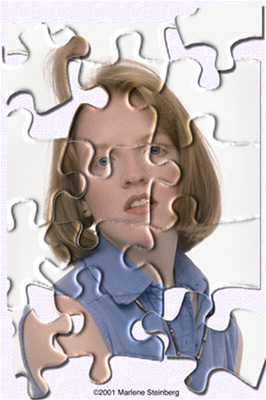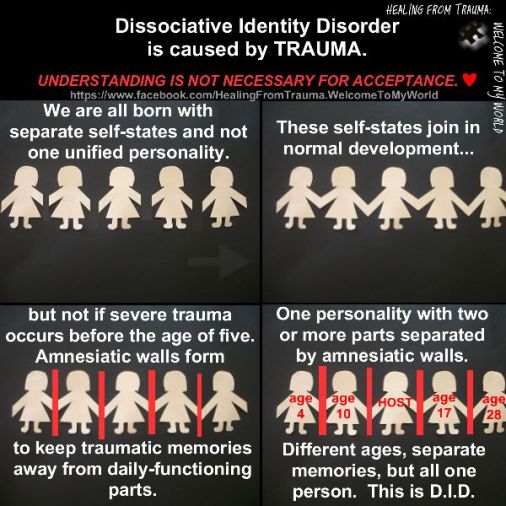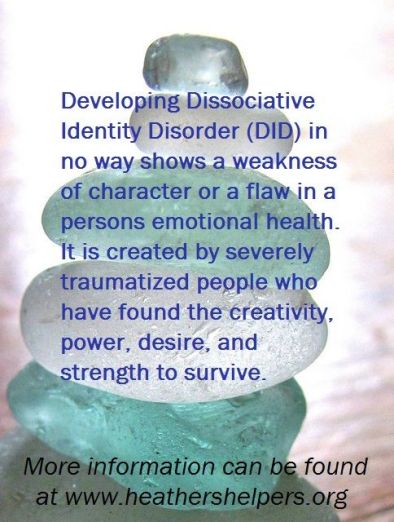Last week I got very deep and personal. That is hard for me to do but I want to thank you all for your amazing comments and kind thoughts. As a group, you helped me see certain situations from a less personal view and that helped me a lot so thank you.
I thought today I would take a break from the really personal stuff and share some information that I was given by a therapist regarding dissociative disorders. Some of you may see yourself or someone else more clearly by learning about them and then many people will hopefully be a lot like me and just a curious George. 😉
I write all of my own blogs but today I am taking a lot of information out of medical journals as well. The references are all listed at the bottom.
Dissociation is a common defense/reaction to stressful or traumatic situations. Severe isolated traumas or repeated traumas may result in a person developing a dissociative disorder. A dissociative disorder impairs the normal state of awareness and limits or alters one’s sense of identity, memory or consciousness. Once considered rare, recent research indicates that dissociative symptoms are as common as anxiety and depression, and that individuals with dissociative disorders (particularly Dissociative Identity Disorder and Depersonalization Disorder) are frequently misdiagnosed for many years, delaying effective treatment. In fact, persons suffering from Dissociative Identity Disorder often seek treatment for a variety of other problems including depression, mood swings, difficulty concentrating, memory lapses, alcohol or drug abuse, temper outbursts, and even hearing voices, or psychotic symptoms. People with dissociation often also seek treatment for a variety of medical problems including headaches, unexplained pains, and memory problems. Many people have symptoms that have gone undetected or untreated simply because they were unable to identify their problem, or were not asked the right questions about their symptoms. Because dissociative symptoms are typically hidden, it is important to see a mental health professional who is familiar with recent advances in the ability to diagnose dissociative disorders through the use of scientifically tested diagnostic tests. (Someone who believes they even exist is a great place to start.)
What kind of events or experiences are likely to cause symptoms of dissociation? There are various types of traumas. There are traumas within one’s home, either emotional, physical or sexual abuse. Other types of traumas include natural disasters, such as earthquakes, political traumas such as holocausts, hostage situations, wars, random acts of violence, or the grief we feel after the death of a family member or loved one. Dissociation is a universal reaction to overwhelming trauma and recent research with indicates that the manifestations of dissociation are very similar world wide.
Misdiagnosis of People with Dissociative Identity Disorder
Most people with undetected Dissociative Identity Disorder experience depression and often are treated with antidepressant medications. While antidepressant medications may help some of the feelings of depression, it does not alleviate symptoms of dissociation. Some people suffering from undetected dissociative symptoms are misdiagnosed as having psychotic disorders including schizophrenia and are treated with antipsychotic medication resulting in long term side effects. Some other common diagnosis that people with Dissociative Identity Disorder receive include:
a) bipolar disorder. Mood swings is a very common experience in people who have a dissociative disorder. If you seek help with a professional who is not familiar with dissociative disorders they may only consider bipolar disorder as the reason for your mood swings, when symptoms of dissociation may be the underlying cause.
b) attention deficit disorder. People with Dissociative Identity Disorder commonly experience problems with attention and their memory. Treatment with medication for ADHD may help some of the symptoms associated with poor attention, but again will not help all the symptoms associated with underlying dissociation.
c) eating disorders. People with eating disorders including anorexia, and binging often experience inner feelings of dissociation and may have a coexisting dissociative disorder.
d) alcohol or drug abuse. People with undetected dissociative disorders frequently self medicate with alcohol or drugs.
e) anxiety disorders. People with undetected dissociative disorders often experience generalized anxiety, panic attacks, obsessive compulsive symptoms. Treating only their anxiety will not help their dissociative symptoms.
Other common clues to a dissociative disorder include the fact that a person seems to experience a lot of different symptoms that come and go, and that they have been in treatment for many years and they still seem to have many of their symptoms.
Some people with undetected dissociative symptoms can function well at work or school. Only close friends or family are aware of the person’s inner struggles or suffering. Some times, a person with undetected dissociation may need to be hospitalized because of feelings of low self esteem, self hatred, self destructive feelings and/or suicidal ideation. The delay in accurate diagnosis results in difficulty maintaining close relationships, working below one’s potential as well as years of unnecessary suffering. This can result in worsening depression and continued mood swings and self destructive behaviors.

People suffering from dissociative disorders can now be identified with the same degree of accuracy as people suffering from other psychiatric or medical disorders. Just like an electrocardiogram can diagnose heart rhythm abnormalities worldwide, individuals who are suffering from a dissociative disorder can now be accurately identified with a test called the SCID-D (Structured Clinical Interview for Dissociative Disorders). Since dissociation is a universal response to overwhelming trauma, it should not be surprising that dissociative symptoms are the same in cultures that may be very different.
A trained therapist can administer the Structured Clinical Interview for Dissociative Disorders (or SCID-D) in order to detect whether a person is experiencing dissociative symptoms and/or a dissociative disorder. Evaluation with the SCID-D can take three to five hours. Since accurate identification of dissociative symptoms can prevent many years of missed diagnosis and ineffective treatments with medications that can cause potentially serious side effects, it is recommended that one seek out a specialized evaluation with a trained mental health professional as soon as possible.
Five Specific Symptoms of Dissociation
The SCID-D can evaluate whether a person is experiencing specific dissociative symptoms and whether these symptoms are interfering with one’s relationships or work and whether the symptoms are causing distress. The five symptoms of dissociation include:
1) Amnesia or memory problems involving difficulty recalling personal information
2) Depersonalization or a sense of detachment of disconnection from one’s self. A common feeling associated with depersonalization is feeling like a stranger to one’s self.
3) Derealization or a sense of disconnection from familiar people or one’s surroundings
4) Identity confusion or inner struggle about one’s sense of self/identity
5) Identity alteration or a sense of acting like a different person
These five symptoms of dissociation are often hidden and cause much inner turmoil and suffering. Often the person experiences a lot of other symptoms such as anxiety, depression and mood swings. The figure titled “Obvious and Hidden Signs of DID” depicts the inner symptoms of dissociation and the more external symptoms a person might describe to a therapist.
The Five Dissociative Disorders
The SCID-D can identify whether a person is experiencing one of the five types of dissociative disorders. The first four are dissociative amnesia, dissociative fugue, depersonalization disorder and dissociative identity disorder (previously called multiple personality disorder). The fifth type of dissociative disorder, called dissociative disorder, not otherwise specified, occurs when a dissociative disorder is clearly present, but the symptoms do not meet the criteria for the previous four.
The five disorders can be distinguished from one another by the nature and duration of their stressors, as well as the type and severity of the symptoms. A brief review of each dissociative disorder is presented below.
Dissociative Amnesia
A defining characteristic of dissociative, amnesia is the inability to recall important personal information. This common dissociative disorder is regularly encountered in hospital emergency rooms and is usually caused by a single stressful event. Dissociative amnesia is often seen in the victims of single severe traumas such as an automobile accident (forgotten details might include one’s actions immediately before an auto accident in which the person with the disorder was involved). The condition is often seen in wartime; witnessing a violent crime or encountering a natural disaster may also trigger dissociative amnesia.
Dissociative Fugue
Like dissociative amnesia, dissociative, fugue also is characterized by sudden onset resulting from a single severe traumatic event. Unlike dissociative amnesia, however, dissociative fugue may involve the creation of a new, either partial or complete, identity to replace the personal details that are lost in response to the trauma. A person with this disorder will remain alert and oriented, yet be unconnected to the former identity. Dissociative fugue may also be characterized by sudden, unplanned wandering from home or work. Typically, the condition consists of a single episode without recurrence, and recovery is often spontaneous and rapid.
Depersonalization Disorder
The distinguishing characteristic of depersonalization disorder is the feeling that one is going through the motions of life, or that one’s body or self is disconnected or unreal. Mind or body may be perceived as unattached, seen from a distance, existing in a dream, or mechanical. Such experiences are persistent and recurrent, and lead to distress and dysfunction. Chronic depersonalization is commonly accompanied by “derealization,” the feeling that features of the environment are illusory. It should be noted that characteristics attributed to depersonalization disorder must be independent of any kind of substance abuse. It should also be noted that depersonalization as an isolated symptom may appear within the context of a wide variety of major psychiatric disorders. For example, mild episodes of depersonalization in otherwise normally functioning individuals have been reported following alcohol use, sensory deprivation, mild social or emotional stress or sleep deprivation, and as a side effect to medications. However, severe depersonalization is considered to be present only if the sense of detachment associated with the disorder is recurrent and predominant.
Dissociative Identity Disorder (previously called Multiple Personality Disorder)
 Dissociative Identity Disorder (DID) occurs in people with varied backgrounds, educational levels, and from all walks of life. DID is believed to follow severe trauma including persistent psychological, physical, or sexual abuse during one’s childhood. In this condition, distinct, coherent identities exist within one individual and are able to assume control of the person’s behavior and thought (American Psychiatric Association, 1987). Unlike depictions in sensationalistic movies, most people with DID do not have dramatic shifts in personality and only persons very close to them are aware of mood swings. In DID, the patient experiences amnesia for personal information, including some of the identities and activities of alternate personalities. Some people with DID experience subtle memory problems, and may only appear to have memory problems associated with attention deficit disorder.
Dissociative Identity Disorder (DID) occurs in people with varied backgrounds, educational levels, and from all walks of life. DID is believed to follow severe trauma including persistent psychological, physical, or sexual abuse during one’s childhood. In this condition, distinct, coherent identities exist within one individual and are able to assume control of the person’s behavior and thought (American Psychiatric Association, 1987). Unlike depictions in sensationalistic movies, most people with DID do not have dramatic shifts in personality and only persons very close to them are aware of mood swings. In DID, the patient experiences amnesia for personal information, including some of the identities and activities of alternate personalities. Some people with DID experience subtle memory problems, and may only appear to have memory problems associated with attention deficit disorder.
DID is often difficult to detect without the use of specialized interviews and/or tests, due to: 1) the hidden nature of the dissociative symptoms, and 2) the coexistence of depression, anxiety, or substance abuse which may mask the dissociative symptoms, and 3) feelings of disconnection that are often difficult to verbalize.
Because people with DID may experience depression, mood swings, anxiety, inattention, transient psychotic like states, and may self-medicate with drugs or alcohol, they are frequently diagnosed as having solely bipolar disorder, major depression, attention deficit disorder, anxiety disorders, psychotic or substance abuse disorders. Studies indicate that previous diagnoses in these areas are common to people with DID. It is not uncommon for a decade or more to pass before a correct assessment of DID is made. Research with the Structured Clinical Interview for Dissociative Disorders has identified five distinct dissociative symptoms experienced in individuals who have DID (see section above, Five Dissociative Symptoms.)
Though DID is the most severe of the dissociative disorders, this disorder can respond well to specialized psychotherapy which focuses on understanding the dissociative symptoms and developing new constructive ways of coping with stress. Medication can be used as an adjunct to psychotherapy, but is not the primary form of treatment.
References
Steinberg M: Handbook for the Assessment of Dissociation: A Clinical Guide. Washington, D.C., American Psychiatric Press, 1995
Steinberg M: The Structured Clinical Interview for DSM-IV Dissociative Disorders-Revised (SCID-D). Washington, D.C., American Psychiatric Press, 1994.
Steinberg M: The Interviewer’s Guide to the Structured Clinical Interview for DSM-IV Dissociative Disorders- Revised. Washington, D.C., American Psychiatric Press, 1994
Steinberg M: Advances in Diagnosing and Treating Dissociative Disorders: The SCID-D-R. Bulletin of the Menninger Clinic. 146-163, Spring 2000





 Hand drawn by Heather. For sale. $20
Hand drawn by Heather. For sale. $20








 Dissociative Identity Disorder (DID) occurs in people with varied backgrounds, educational levels, and from all walks of life. DID is believed to follow severe trauma including persistent psychological, physical, or sexual abuse during one’s childhood. In this condition, distinct, coherent identities exist within one individual and are able to assume control of the person’s behavior and thought (American Psychiatric Association, 1987).
Dissociative Identity Disorder (DID) occurs in people with varied backgrounds, educational levels, and from all walks of life. DID is believed to follow severe trauma including persistent psychological, physical, or sexual abuse during one’s childhood. In this condition, distinct, coherent identities exist within one individual and are able to assume control of the person’s behavior and thought (American Psychiatric Association, 1987). 



